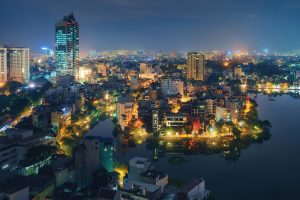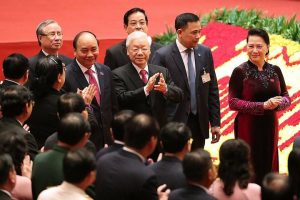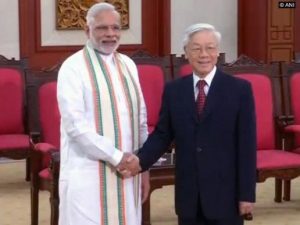
The 13th National Congress of the Communist Party of Vietnam has culminated in the re-election of Nguyen Phu Trong for a rare third term as General Secretary of the ruling party. The party congress ended on an optimistic note, with the country’s newly re-elected Communist Party chief proclaiming “Great success! Glory to the Socialist Republic of Vietnam!.”
The once-in-five-years party congress was watched closely in key regional and global capitals for the future direction of Vietnam, which has emerged as Asia’s star economic performer after curbing the coronavirus pandemic successfully. The powers-that-be in the Communist Party of Vietnam should be commended for an orderly and friction-free conduct of the five-yearly party congress. The party congress, which formally ended on February 1, lived up to its motto: “Unity, Democracy, Discipline, Creativeness, and Development.” The congress was attended by around 1600 delegates representing more than 5.1 million Party members from across the country.
The re-election of the 76-year-old Trong, one of Southeast Asia’s longest-serving leaders, for a record third term is a powerful vote of support for his trademark “blazing furnace” crackdown on corruption and sends the message across that people of the country and the world at large can expect clean and transparent governance under his watch. In a closing ceremony speech at the party congress on February 1, Mr Trong exhorted the party cadre not to be “complacent and arrogant” and to prepare themselves for challenges of national renewal. “There will be many opportunities and advantages, but also lots of challenges and difficulties that are unpredictable,” Mr Trong said a day after his re-election. “Therefore, we must not be negligent, must not be complacent, arrogant. We have to be humble and learn more to deserve people’s trust.”
Scaling up Economic Growth

Mr Trong’s revalidation as the country’s most powerful leader since the legendary Ho Chi Minh is a tribute to his visionary policy that combines pragmatism as well as national self-belief in Vietnam’s destiny. With many countries planning to shift production and supply chains from China to Vietnam, another term for Mr Trong at the top will be reassuring and an additional reason for foreign companies to invest in this emerging economy of 98 million people.
Building on the party’s pivotal role in steering Doi Moi economic reforms of the 1980s, Mr Trong is expected to push the envelope to accelerate Vietnam’s economic resurgence. The wide-ranging economic and political reforms under Doi Moi (Renovation period), launched in 1986, have transformed Viet Nam from one of the world’s poorest nations into a lower middle-income country. According to the General Statistics Office, in 1986, Viet Nam’s total exports and imports stood at nearly US$3 billion and the trade deficit was estimated at US$1.5 billion. All the economic indicators have changed now. In 2019, the nation’s total trade value exceeded US$517 billion and the trade surplus reached US$11 billion. According to the report of the World Bank, between 2002 and 2018, GDP per capita increased by 2.7 times, reaching over US$2,700 in 2019, and more than 45 million people were lifted out of poverty. Poverty rates declined sharply from over 70% to below 6%.
The pandemic may have dampened sentiments, but Hanoi continues to remain the darling of international investors. Foreign companies have put $6.4 billion into existing FDI projects, up 10.6 percent year-on-year, underscoring confidence in Vietnam’s growth. The country’s prospects for economic growth have been reinforced by the EU-Vietnam Free Trade Agreement, Vietnam-UK Free Trade Agreement and the Regional Comprehensive Economic Partnership (RCEP), the world’s largest trade deal.

This upward economic trajectory will set the stage for Vietnam’s target of achieving the status of a developed country. “We aim to make our country a developed country, following the socialist orientation, by the middle of the 21st century,” Mr Trong said after the party congress.
Delegates at the national party congress endorsed a five-year economic blueprint that calls for scaling up share of private companies to more than half of the economy by 2025 and to nearly double per-capita gross domestic product to $4,700-$5,000 by 2025, from $2,750 at the end of 2020 and $1,331 in 2010.
The resolution of the 13th National Party Congress, adopted at the event’s closing session, targets that Vietnam will become a socialist-oriented developed country by the mid-21st century. The party congress also set key national development targets: by 2025, Vietnam will become a developing country with modernity-oriented industry and move up and out of the lower-middle income level; by 2030, when the Party marks its centenary, Vietnam will be a developing country with modern industry and upper-middle incomes; and by 2045, when the Democratic Republic of Vietnam, now the Socialist Republic of Vietnam, turns 100, the country will become a developed one with high incomes.
The resolution spells out main targets on socio-economic development for 2021-2025.The average GDP growth rate in the period is projected at 6.5-7 percent a year, and GDP per capita will reach 4,700-5,000 USD by 2025.This would mean Vietnam’s GDP growth rate will be higher than that of China which is expected to grow at 8.4% in 2021, before slowing to 5.5% in 2022.The overarching focus of the leadership will be to curb the pandemic comprehensively and sustain the pace of economic growth.
Shaping Global Agenda

The party congress has also unveiled an ambitious agenda for facilitating Vietnam’s bigger role on the global stage. Under Mr Trong’s watch, the Communist Party of Vietnam not only played a crucial role in promoting political stability in the country, but also in steering Hanoi’s rise on the global stage.
The most recent manifestation of Vietnam’s rising regional stature was the successful ASEAN summit Hanoi hosted as the ASEAN Chair for 2020. In 2017, Vietnam hosted APEC summit, a mega diplomatic event in the scenic seaside resort which was attended by a galaxy of world leaders, including then US President Donald Trump. In the realm of foreign policy, Vietnam’s top party brass led by Mr Trong deftly juggled relations with the world’s two top leading economies, including mutually antagonistic US and China.
In 2020, Vietnam successfully served as a non-permanent member of the United Nations Security Council in the first of its two years in office. Vietnam’s involvement in the UN deliberations and its initiatives made an important contribution to safeguarding international peace and stability, Deputy Foreign Minister Le Hoai Trung said.
Hanoi can take pride in its achievements as an UNSC non-permanent member. Hanoi successfully served as rotating Chair of the UN Security Council and organized the open debate session on “Promoting compliance with the UN Charter to keep International Peace and Security.” Vietnam also held a meeting of the five permanent and ten non-permanent members of the UN Security Council, and an international conference on the role of women in building and strengthening peace.
Party General Secretary and State President Nguyen Phu Trong, Prime Minister Nguyen Xuan Phuc, National Assembly Chairwoman Nguyen Thi Kim Ngan, and Deputy Prime Minister and Foreign Minister Pham Binh Minh attended and delivered speeches via video-conferencing at high-level activities within the framework of the 75th session of the UN General Assembly, which affirmed Vietnam’s strong commitment to multilateral cooperation and the UN’s central role in solving common global challenges, including those relating to peace and security.
Vietnam fulfilled the dual roles of a non-permanent UNSC member and the Chair of ASEAN in 2020, thereby helping to promote and uphold ASEAN’s solidarity and role, connect the bloc with the UN and the UNSC, and realise some of ASEAN’s global-level commitments to maintaining regional and international peace and stability. As chair of ASEAN, Vietnam played a key role in maintaining solidarity among ASEAN members to deal with the Covid pandemic and reached a record number of agreements.A record number of 80 agreements have been signed and approved,” said Vietnam’s Ambassador to India Pham Sanh Chau.
In the next few years, one can expect broad directions of foreign policy to continue that entails sustaining and upscaling close ties with ASEAN and leading regional and global powers and playing a proactive role in global diplomacy.
Delhi-Hanoi Bonding

India will continue to feature high on Vietnam’s foreign policy calculus. Vietnam will also continue to mobilise the region and the international community against China’s plans to alter the status quo in the South China Sea. Vietnam will not compromise on its oft-stated territorial claims. In this regard, Hanoi expects New Delhi to be play a more proactive role.
Vietnam’s top leadership has identified India as a major focus country in its foreign policy and economic plans. One can expect the “Joint Vision for Peace, Prosperity and People,” that emerged from the first-ever virtual summit between the prime ministers of India and Vietnam in December to acquire greater force and traction in months and years to come. Besides enhanced collaboration in post-pandemic economic recovery and supply chains, Comprehensive Strategic Partnership between the two countries will acquire greater depth, both in the bilateral context as well as in the context of ASEAN and multilateralism.
Vietnam and India will continue to enhance practical cooperation between ASEAN and India in in line with the objectives stated in the ASEAN Outlook on Indo-Pacific (AOIP) and India’s Indo-Pacific Oceans Initiative (IPOI). India-Vietnam strategic collaboration in the Indo-Pacific is set to deepen in years to come.
Looking ahead, India and Vietnam, which are concurrently serving as non-permanent members in the United Nations Security Council, will deepen the global dimension of their partnership by proactively expanding cooperation in cross-cutting issues such as terrorism, pandemics, sustainable development and promoting reform and democratisation of the UNSC. The party congress has envisaged the steady transformation of Vietnam into a developed country by the middle of the 21st century. In this inspiring journey of Vietnam’s transformation, India will be an indispensable partner. This blossoming partnership will be showcased during the celebrations of the 5th anniversary of establishment of the Comprehensive Strategic Partnership in 2021 and the 50th year anniversary of Diplomatic Relations between the two countries in 2022.
Author Profile

- Manish Chand is Founder and Editor-in-Chief of India Writes Network (www.indiawrites.org) and India and World, a pioneering magazine focused on international affairs. He is CEO, Centre for Global India Insights, an India-based think tank focused on global affairs.
Latest entries
 India and the WorldFebruary 27, 2026Modi visit: India-Israel partnership enters a new era
India and the WorldFebruary 27, 2026Modi visit: India-Israel partnership enters a new era India and the WorldFebruary 24, 2026Unravelling Modi’s Israel journey: What to expect
India and the WorldFebruary 24, 2026Unravelling Modi’s Israel journey: What to expect India and the WorldFebruary 17, 2026South-by-South: Focus on people-centric solutions at India AI summit
India and the WorldFebruary 17, 2026South-by-South: Focus on people-centric solutions at India AI summit India and the WorldFebruary 7, 2026Modi hails interim India-US trade deal, Goyal says no concessions made on agriculture
India and the WorldFebruary 7, 2026Modi hails interim India-US trade deal, Goyal says no concessions made on agriculture







